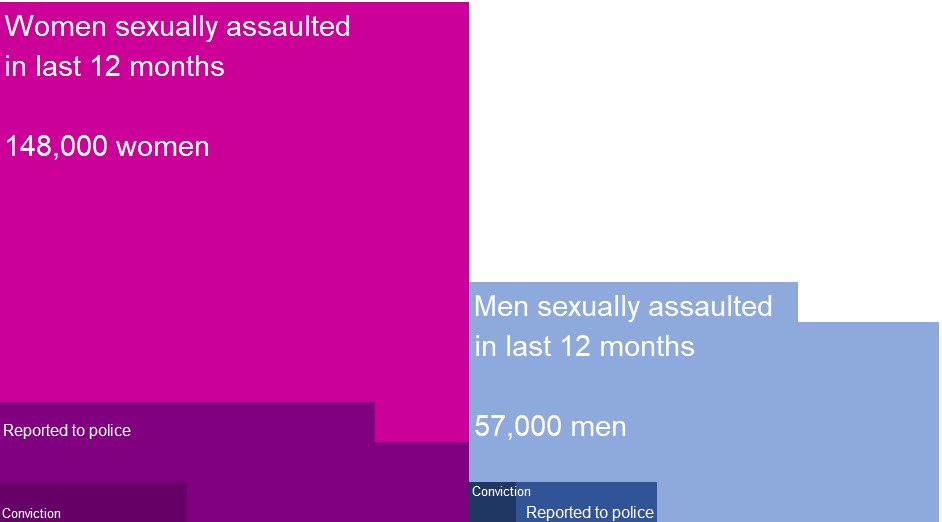Like many in Australia in the last few weeks, I’ve been horrified by the many historical and current stories coming from Federal parliament and Sydney school children about rape and sexual harassment. So its time to look at some statistics.
There are around 20 million people in Australia over the age of 15.
- In the last 12 months approximately 1.6 million women and 840,000 men – nearly 2.5 million people – have experienced sexual harassment of any kind.
- Included in this are around 148,000 women and 57,000 men who were sexually assaulted – 201,000 people.
- Police were notified of 23,000 of these sexual assaults.
- Around 5,000 people were convicted of sexual assault, 97% of them men.
By proportions for all people over 15 in Australia:
- 1 in 6 women and 1 in 10 men experienced sexual harassment in the last 12 months – 1 in every 7.5 people
- 1 in 60 women and 1 in 170 men experienced sexual assault in the last 12 months – 1 in every 90 people
- 1 in 10 of those sexual assaults were reported to police
- 1 in 40 of those sexual assaults resulted in a criminal conviction
I’ve shown these proportions for sexual assault below in graphical form.

The main source for these statistics was an excellent report on sexual assault from the Australian Institute for Health and Welfare (AIHW), which pulls together a lot of statistics, including particularly a survey by the ABS on personal safety from 2016. The survey asked people about their experiences of violence (not just sexual violence). My statistics are based on the 2016 population and 2016 experience, but it is important to note that the experience of sexual assault for women in particular is increasing not decreasing so these are, if anything, an understatement. The most difficult statistic to find (largely because the sources are different) is the rate of conviction of sexual assault, but no matter where you look the numbers of convictions are a very very small proportion of the number of assaults (I’ve shown the highest number of the ones I found).
How do you define sexual harassment?
Sexual harassment was considered to have occurred when a person experienced or had been subjected to one or more selected behaviours which they found improper or unwanted, which made them feel uncomfortable, and/or were offensive due to their sexual nature. The sexual harassment behaviours included in the PSS were:
- receiving indecent phone calls
- receiving indecent texts, emails or post
- indecent exposure
- inappropriate comments about the person’s body or sex life
- unwanted touching, grabbing, kissing or fondling
- distributing or posting pictures or videos of the person, that were sexual in nature, without their consent
- exposing the person to pictures, videos or materials which were sexual in nature that the persons did not wish to see.
This story (from the UK) describes just one example.
And what is the definition of sexual assault?
Sexual assault is a type of sexual violence that involves any physical contact, or intent of contact, of a sexual nature against a person’s will, using physical force, intimidation or coercion . It can be aggravated in nature (including rape, attempted rape, sexual assault with a weapon, indecent assault, penetration by objects, forced sexual activity that did not end in penetration, attempts to force a person into sexual activity) or non-aggravated in nature (such as indecent assault without aggravating circumstances or threat of sexual activity) .
This was a difficult post for me to write and research and may be hard for you to read. Australian support for victims of sexual assault is available at 1800 RESPECT which provides confidential sexual assault and family and domestic violence counselling via phone and webchat. Available 24 hours a day, seven days a week. Phone: 1800 737 732.
If you have got this far, here is a bit of beauty – a lotus flower.


Jennifer, thanks for raising this difficult and severely under-addressed issue.
Thanks, Jennifer. Well done for addressing this topic and I am sure that reliable statistics are hard to find. I found the Marina Hyde article to be particularly alarming, because it she related her experience in such a real manner. Why ARE they so angry?
Thanks Jennifer for that very helpful and most difficult post. I think we are all fed up with what is happening. I think many of us are tired of being polite and waiting for things to improve and for the situation to be adequately addressed. It doesn’t seem so unreasonable to assume that we all have the right to feel safe in our homes, workplaces and communities.